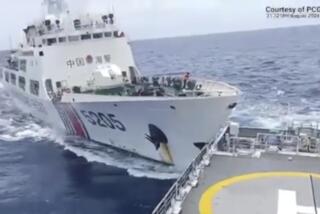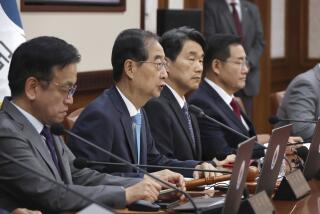N. Korea ‘Regrets’ Skirmish at Sea
- Share via
TOKYO — North Korea expressed regret Thursday for a naval battle last month that killed at least four South Korean sailors, and it offered to renew working-level talks aimed at improving relations between the wary neighbors.
The Communist regime in Pyongyang, however, stopped short of accepting blame for the clash, which occurred in disputed, seafood-rich waters of the Yellow Sea. The fight prompted Washington to withdraw its offer for high-level meetings with the North.
“We regret the accidental armed clash which happened a short while ago, and we believe that both North and South must make joint efforts to prevent such an incident from recurring,” North Korean Cabinet official Kim Ryong Sung said in a message relayed to South Korean Unification Minister Jeong Se Hyun, according to officials in the South.
South Korea’s government, which had demanded a full apology and prosecution of the Northern sailors responsible, embraced the statement as “highly significant.”
“We view North Korea’s expression of regret and its reference to efforts at preventing further incidents as a de facto apology,” the Unification Ministry said in a statement.
The South Korean government is eager to show that its so-called sunshine policy of engaging the North is not a failure: The ruling party faces two key elections before year’s end, and public opinion has hardened against the North.
Apologies from North Korea have been relatively rare in the nearly six decades of tensions on the divided peninsula. These include one issued in 1976, when its troops killed two U.S. soldiers with axes at the village of Panmunjom in the demilitarized zone, and in 1996, when one of its submarines ran aground off South Korea’s east coast, triggering a manhunt that left 13 South Koreans dead.
It remains to be seen, however, how well the half-apology will be received beyond the Korean peninsula.
“It’s exactly what needed to be done to put the incident behind them on the inter-Korean side,” said Scott Snyder, Seoul representative of the Asia Foundation, a San Francisco-based organization that studies U.S.-Asia relations. “Now the question is whether this can open the way for a resumption of U.S.-North Korea meetings.”
Officials from Washington and Pyongyang are scheduled to attend a Southeast Asian regional forum that will begin next week in Brunei, which provides an opportunity for a meeting. Japanese media reported Thursday that Japan and North Korea planned to meet for the first time in two years.
South Korea’s ruling Millennium Democratic Party hopes that the expression of regret Thursday and the promise of renewed contact in August at North Korea’s Mt. Kumgang resort will help its flagging electoral fortunes.
In particular, the scandal-plagued government would like to pull off a meeting of separated families before the December presidential election.
Although most South Koreans welcome any easing of tension, they have also grown wary of Pyongyang’s intentions. Some are also suspicious of their own government’s bid to trumpet progress.
“I don’t know if this will all be received that warmly by voters,” said Lee Dong Bok, professor at Seoul’s Myongji University. “I think too many people smell some political scent.”
Although it’s difficult to determine the motive for North Korea’s statement, which came only a day after it warned Seoul to expect more trouble, fear and desperation might be factors.
Washington has indicated that it is considering a preemptive strike against Iraq, one of three nations President Bush labeled part of a global “axis of evil.” Iran and North Korea were the others.
“I believe North Korea is watching very closely the U.S. policy toward Iraq,” Snyder said. “If I were sitting in Pyongyang, I’d be a little more nervous than before.”
After the clash at sea, Seoul threatened to give 300,000 tons of surplus rice to livestock rather than the hungry North. The South also debated whether to stop tourist visits to Mt. Kumgang, which provide a source of hard currency for North Korea.
*
Chi Jung Nam in The Times’ Seoul Bureau contributed to this report.
More to Read
Sign up for Essential California
The most important California stories and recommendations in your inbox every morning.
You may occasionally receive promotional content from the Los Angeles Times.










